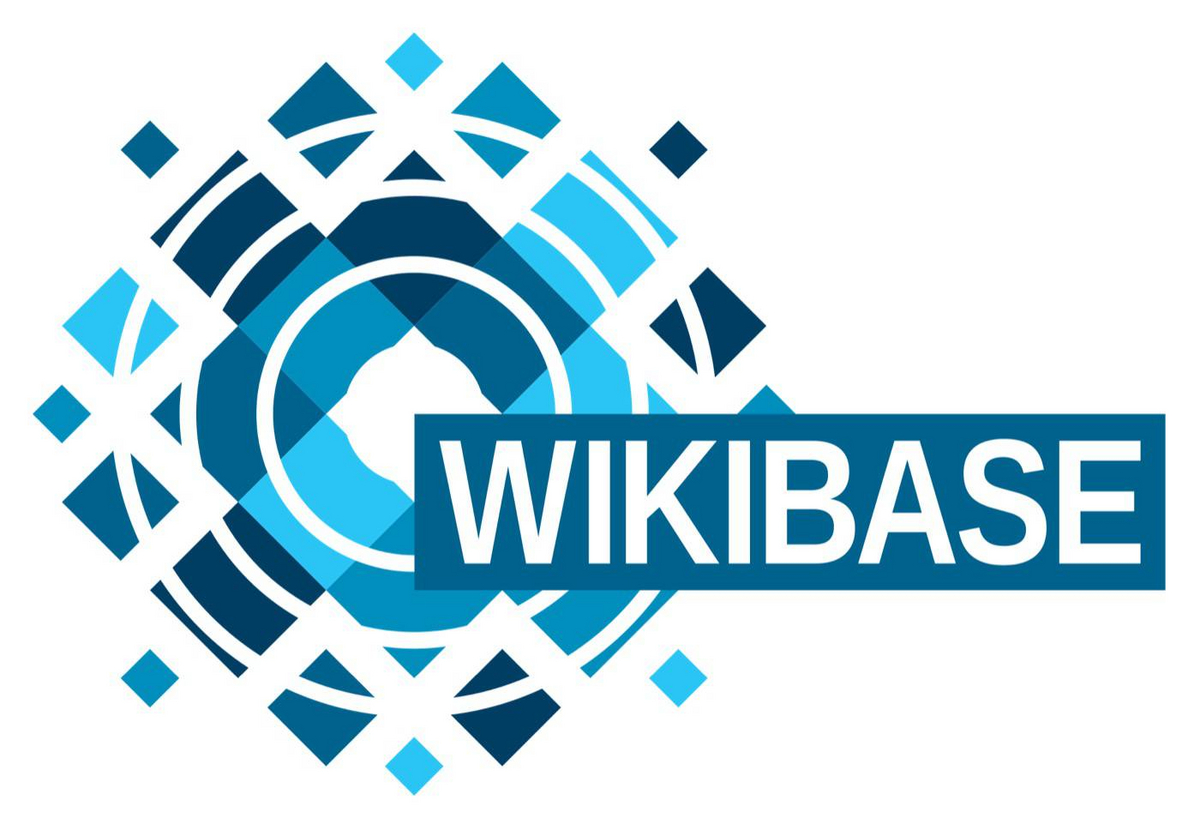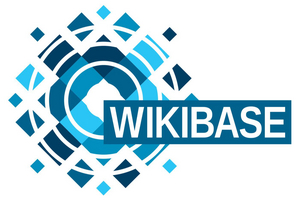
Wikibase logo
"Logo of the Wikibase Software" GNU General Public License 2.0
NFDI4Culture, Wikimedia Deutschland and the NFDI Directorate invited all researchers and data managers from already funded or planned NFDIs to participate in the first Wikibase Workshop. The goal of the workshop was to discuss experiences and best practices in the field of knowledge graph enabled research data management with Wikibase.
After an introduction to the Wikibase plattform, research projects already using Wikibase or other knowledge graph enabled research data management tools were presented as lightning talks.
Wikibase Introduction and Q&A
Georgina Burnett and Samantha Alipio, Wikimedia Deutschland
Link to slides: docs.google.com/presentation/d/1rRTGXPhhvm0sBWYrED2bNaKtl-JXv8RC0KKNnegZER8/edit
The presentation began with an introduction of Wikimedia Deutschland and its software development department which is responsible for developing the software Wikibase. Wikibase started out as the software behind wikidata.org, one of the biggest linked data hubs on the web whose data as well as data model is user curated and created. The focus is on user-centered development. Wikibase’s strengths are the ability for collaboration, multilingual support and the data being human readable as well as machine readable.
The next part of the presentation concerned the government process, or how code is added and maintained. Volunteers, as well as staff can contribute code, but only “maintainers” (who can be volunteers as well) can approve changes. Wikimedia Deutschland functions as a code steward who makes development policies and organizes the process. To connect with other users and developers, people can join the community user group (https://meta.wikimedia.org/wiki/Wikibase_Community_User_Group) and their the monthly community calls or join the telegram channel (https://t.me/joinchat/HGjGexZ9NE7BwpXzMsoDLA). For institutional users who want to make large changes, it is recommended to work out a joint plan with Wikimedia.
To end the presentation, an outlook on further development was given. The roadmap (https://www.wikidata.org/wiki/Wikidata:Development_plan#Wikibase_ecosystem) for 2021 focuses on federation, improving the installation and setup process as well as improving software development and maintenance. Federation can have different definitions. The roadmap will prioritize the ability of third-party Wikibases to connect with Wikidata. The next planned in release in spring 2021 will include the ability to reuse properties from Wikidata. Another new development is the integration of Wikibase manifests, files that communicate the Wikibase’s configuration to tools.
The presentation was met with a very active discussion. One of the questions was about possible changes to the development roadmap to meet NFDI software needs. However, significant changes cannot be made to the roadmap at this point, although Wikimedia is willing to participate in further NFDI Wikibase workshops. For now, the general meeting place for Wikibase users are the monthly calls, but the community communications team is working on adding to that. There were also some questions about the mechanics of federations and how items would be automatically matched to each other which is currently not being worked on. In addition to the big interest in federation, many people would like to develop their own ontologies and asked about ways to import them. There is now streamlined process yet.
Lightning Talks
FactGrid (Olaf Simons, Forschungszentrum Gotha)
Factgrid is a collaborative database for historical research. Researchers are welcome to add data from their own projects. Factgrid is currently working to implement the GND.
Slides: twitter.com/FactGrid
Links: blog.factgrid.de
ABCD Ontology
David Fichtmüller, Botanic Garden and Botanical Museum (BGBM) Berlin
The ABCD Ontology describes biological collections. In the presented project, the ontology which was originally an XML schema, was transferred to Wikibase using Schema Parser, OpenRefine and QuickStatements and validated via Sparql queries. David‘s best advice to newcomers is to use the Docker image of Wikibase instead of attempting the full installation on their own.
Slides: docs.google.com/presentation/d/1i91OB9xPZVVovd8c7Cm2sOglQLM8CEeZed8grdVaFwU/edit
Links: abcd.tdwg.org (Website), wiki.bgbm.org/bdidata/index.php/BDI_Data:Main_Page (Wikibase)
Platform MaterialDigital
Philipp von Hartrott, IWM Freiburg
The platform aims to be a materials dataspace to make knowledge about materials machine readable. The presentation shows its architecture and presents a sample knowledge graph.
Documenting Materials Provenance and Testing with Wikibase
Philipp von Hartrott,IWM Freiburg
The project is about making data about projects in materials science more FAIR and therefore easier to reuse. Their wish for Wikibase is to make properties from other knowledge graphs usable and to include domain and range restrictions.
MuseWiki
Johannes Hentschel, EPFL Lausanne
MuseWiki is a Wikibase about musicology topics such as works, people, places analyses. It uses a flattened version of CIDOC-CRM to model the data. The presentation describes how they were able to integrate that ontology in Wikibase. For the future, their plans are to become a linked datahub for all relevant musical data from different sources such as Wikidata or RISM.
Slides: https://docs.google.com/presentation/d/1B1gSXwMj4PFQJtlbTw_lr64QM3ISGZHLcYZe7CKywUo/
Links:
lightening talk: youtu.be/5fXzBWN64ws
MuseWiki: muwi.epfl.ch/
SPARQL query service: mwquery.epfl.ch/
ArtBase
Lozana Rossenova, Rhizome
Rhizome has an online archive of born-digital art – the ArtBase which is currently being restructured into Wikibase. They are currently working on customizing the software to fit their needs, such as using images that are not being hosted on Wikimedia Commons and further developing the query service.
Slides: docs.google.com/presentation/d/1J9ID6mnACbat-TN1GhRY2fqoigE3KUVjxImp6tp79-w/edit
GND
Barbara Fischer, DNB
The GND (Gemeinsame Normdatei) is the authority file from the German national library. 9 million items and 300 properties are being imported into a Wikibase instance to open up the GND to non-library contributors. They see some possible issues with using Wikibase and are promoting the Wikilibrary manifesto to encourage improvement.
Slides : docs.google.com/presentation/d/1WcEce9DpnKPR9SxduhHt5tdcwzOh4BToj94VSmz6YNw/edit on twitter @gndnet
Links:
GND on twitter @gndnet
BERD: The knowledge graph of German companies
Renat Shigapov & Irene Schumm, UB Mannheim
Berd@BW is creating a knowledge graph of German companies. Wikibase suits their purpose well, but they would like to see more tools to improve. They themselves have already created tools for annotating tabular data and for quick data import into Wikibase.
Slides: madoc.bib.uni-mannheim.de/58793/1/2021-02-23_BERD_Shigapov_Schumm.pdf)
Links:
BERD@BW project page: www.berd-bw.de
BERD@NFDI project page: www.berd-nfdi.de
Links to tools: www.berd-bw.de/knowledge-graph
Semantic annotator for tabular data: github.com/UB-Mannheim/bbw
Overall discussion points and questions
The workshop concluded with a general discussion. The topics included how to deal with a full-fledged ontology in Wikibase, which led to the question whether it is possible to create a generic data model in Wikibase that could be reused for other Wikibases. Another point was the development of Wikibase in the future and how to collaborate with Wikimedia on this task. Since there are many different interest groups whose needs Wikimedia has to take into consideration, it might also be advisable to start a new branch of the Wikibase software which focuses specifically on the NFDI. The quality of the technical documentation as well as long term maintainability were identified as important to anyone that is considering their own installation.
Conclusion and outlook
This event gave a great insight into the possibilities as well as challenges of Wikibase and how it is already used. The presented projects were at different stages and had different technical focuses and solutions. Many of the researchers and data managers who attended had not yet decided whether to use Wikibase as a software at all. This workshop could answer many of their questions and hopefully contribute to a decision.
A next workshop is already planned for the beginning of July. This time, the focus will be on more concrete challenges and hands-on tutorials. If you want to be sure not to miss the invitation, please write a short mail to lucia.sohmen@tib.eu.
